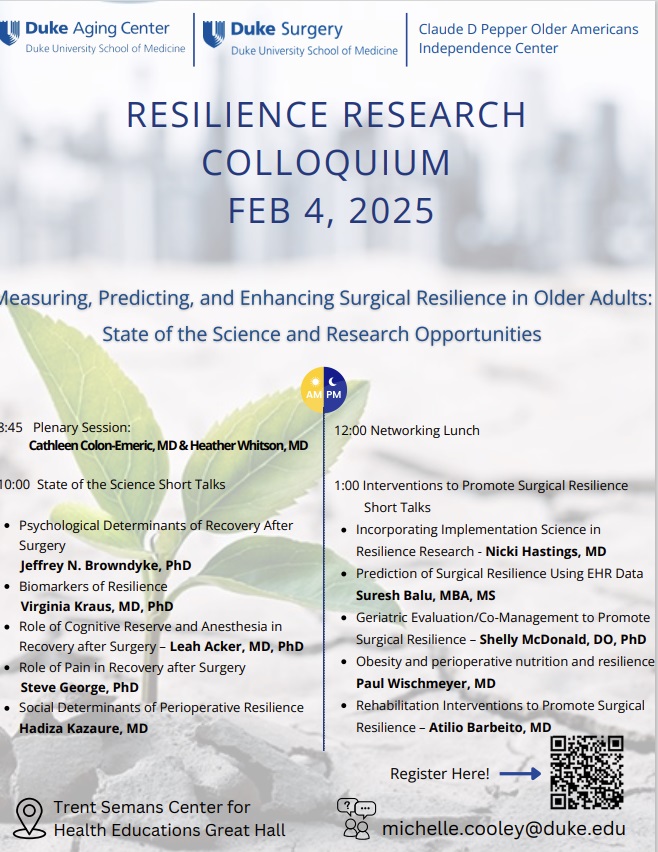Tuesday, February 4, 2025
8:30 am - 2:30 pm
Trent Semans Center Great Hall
Duke University School of Medicine
Click Here to Register
Registration deadline: January 30, 2025

AGENDA:
Objectives
- Summarize the state of the science in measuring, predicting, and intervening to improve surgical resilience in older populations
- Identify key research and practice gaps and opportunities that would move us toward optimizing resilience in surgical populations
- Foster new clinical and research collaborations across disciplines by learning how colleagues at Duke are working to improve resilience in surgical populations
Schedule
8:15-8:30 am Registration, coffee, networking
8:30-8:45 am Welcome, introduction to goals and speakers, case studies
8:45-9:45 am Plenary Session: Cathleen Colon-Emeric, MD & Heather Whitson, MD
9:45-10:00 am BREAK
10:00-12:00 pm State of the Science Short Talks – (15 min each)
10:00-10:15am Psychological Determinants of Recovery After Surgery – Jeffrey N. Browndyke, PhD
10:15-10:30am Biomarkers of Resilience – Virginia Kraus, MD, PhD
10:30-10:45am Role of Cognitive Reserve and Anesthesia in Recovery After Surgery- Leah Acker, MD, PhD
10:45-11:00am Role of pain in recovery after surgery – Steve George, PhD
11:00-11:15am Social Determinants of Perioperative Resilience – Hadiza Kazaure, MD
11:15-12:00pm Moderated Discussion
NOON Networking Lunch – Discussion themes at different tables with designated facilitator: Analytic issues in perioperative resilience; Measurement strategies in perioperative resilience; Interprofessional care models for perioperative resilience; Mechanisms of perioperative resilience; Equity issues in perioperative resilience
1:00-2:30 pm Interventions to Promote Surgical Resilience Short Talks – (15 min each)
1:00-1:15pm Incorporating Implementation Science in Resilience Research – Nicki Hastings, MD
1:15-1:30pm Prediction of Surgical Resilience Using EHR Data - Suresh Balu, MBA, MS
1:30-1:45pm Geriatric Evaluation/Co-Management to Promote Surgical Resilience – Shelly McDonald, DO, PhD
1:45-2:00pm Obesity and Perioperative Nutrition and Resilience – Paul Wischmeyer, MD
2:00-2:15pm Rehabilitation interventions to promote surgical resilience – Atilio Barbeito, MD
2:15-2:30pm Moderated Discussion
2:30 pm Wrap-up, Evaluations, Postcard to myself:
Write down one idea/collaboration you will integrate into practice or research in the next 90 days; we will mail this to you in 3 months